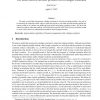Free Online Productivity Tools
i2Speak
i2Symbol
i2OCR
iTex2Img
iWeb2Print
iWeb2Shot
i2Type
iPdf2Split
iPdf2Merge
i2Bopomofo
i2Arabic
i2Style
i2Image
i2PDF
iLatex2Rtf
Sci2ools
IPL
2007
2007
The finite horizon investor problem with a budget constraint
We study a model that incorporates a budget constraint in a decision making problem. Our goal is to maximize the expected wealth, where in each time period we can either stop the business getting our current wealth or to continue one additional time period and getting a random revenue. We show that when the wealth is scalar, the problem is NP-hard and we provide an FPTAS. However, when the wealth is vector with at least two components the problem cannot be approximated. Keywords. Approximation algorithms, Dynamic programming with a budget constraint.
Related Content
| Added | 15 Dec 2010 |
| Updated | 15 Dec 2010 |
| Type | Journal |
| Year | 2007 |
| Where | IPL |
| Authors | Asaf Levin |
Comments (0)

